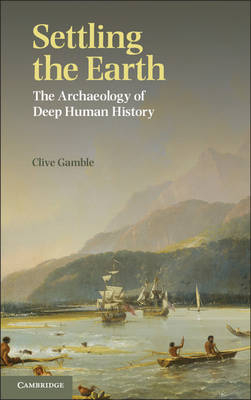
Settling the Earth
Cambridge University Press (Verlag)
978-1-107-60107-9 (ISBN)
In this worldwide survey, Clive Gamble explores the evolution of the human imagination, without which we would not have become a global species. He sets out to determine the cognitive and social basis for our imaginative capacity and traces the evidence back into deep human history. He argues that it was the imaginative ability to 'go beyond' and to create societies where people lived apart yet stayed in touch that made us such effective world settlers. To make his case Gamble brings together information from a wide range of disciplines: psychology, cognitive science, archaeology, palaeoanthropology, archaeogenetics, geography, quaternary science and anthropology. He presents a novel deep history that combines the archaeological evidence for fossil hominins with the selective forces of Pleistocene climate change, engages with the archaeogeneticists' models for population dispersal and displacement, and ends with the Europeans' rediscovery of the deep history settlement of the Earth.
Clive Gamble is Professor of Archaeology at the University of Southampton and one of the world's leading authorities on the archaeology of early human societies. He is founder of the Centre for the Archaeology of Human Origins at the University of Southampton. Gamble has travelled extensively to see firsthand the evidence for social change from our earliest past and most recently visited every continent while filming an acclaimed six part documentary entitled Where Do We Come From? for the UK's 5 network. He has held visiting positions at the Australian National University; the Museo de la Plata, Argentina; and the universities of LaTrobe, Boston and Alaska. He is much sought after as a keynote speaker at international conferences and has been a frequent contributor to national radio. His many groundbreaking books include The Palaeolithic Settlement of Europe (1986); Timewalkers: The Prehistory of Global Colonisation (1993); The Palaeolithic Societies of Europe (1999), the 2000 winner of the Society of American Archaeology Book Award; Archaeology: The Basics (2001); and Origins and Revolutions: Hominin Identity in Earliest Prehistory (2007). In 2005 Gamble was awarded the Rivers Memorial Medal by the Royal Anthropological Institute in recognition of his outstanding contribution to the field and in 2008 he won the Henry Stopes Medal from the Geologists' Association. He was elected a Fellow of the British Academy in 2000, appointed a Trustee to the British Museum in 2010, and elected President of the Royal Anthropological Institute in 2011, the first archaeologist to hold this post in more than thirty years.
1. The worlds of deep human history; 2. The drivers of climate and environment; 3. The recent veneers of climate, environment, and population; 4. Walking and running down the tectonic trail; 5. Three strides across a bio-tidal world; 6. Going beyond, keeping in touch; 7. The call of the north; 8. Eyes on the horizon; 9. The human re-union in retrospect.
| Zusatzinfo | 57 Tables, unspecified; 32 Maps; 2 Halftones, unspecified; 33 Line drawings, unspecified |
|---|---|
| Verlagsort | Cambridge |
| Sprache | englisch |
| Maße | 152 x 228 mm |
| Gewicht | 620 g |
| Themenwelt | Geisteswissenschaften ► Archäologie |
| Geschichte ► Allgemeine Geschichte ► Vor- und Frühgeschichte | |
| Geschichte ► Teilgebiete der Geschichte ► Kulturgeschichte | |
| Studium ► 1. Studienabschnitt (Vorklinik) ► Histologie / Embryologie | |
| Naturwissenschaften ► Biologie ► Evolution | |
| Naturwissenschaften ► Geowissenschaften ► Geografie / Kartografie | |
| Sozialwissenschaften ► Ethnologie | |
| Sozialwissenschaften ► Soziologie | |
| ISBN-10 | 1-107-60107-X / 110760107X |
| ISBN-13 | 978-1-107-60107-9 / 9781107601079 |
| Zustand | Neuware |
| Haben Sie eine Frage zum Produkt? |
aus dem Bereich


